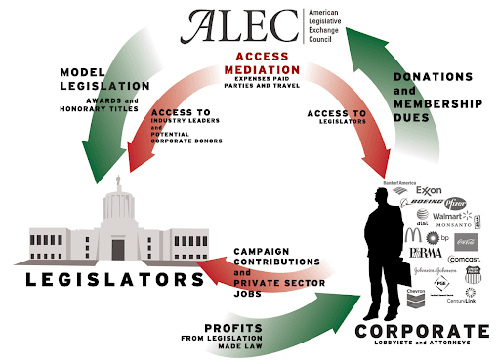Powerful industry lobby group behind 5G roll-out despite public opposition and health dangers
For the average American, bills that are introduced into state legislatures, especially those with bipartisan support, generally become the law of the state. But how often does the average citizen of any state review the bills in different committees or the laws passed and signed by the governors that have a direct impact upon their lives?

We would imagine very few. What does it mean when a bill in California, for example, that mandates a change in an existing environmental law that protects citizens but in turn permits and protects corporations to pollute the environment, water and air with impunity? Then that same bill shows up in other states across the nation. How does that happen?
One past example is bills to ban GMO labeling that were virtually the same in California, Oregon, Colorado and elsewhere. The same is true for hydro-fracking and pipeline installations, roll backs on environmental protections, public funds for charter schools, increasing the private prison system, gun rights, keeping drug costs high, etc.
These are only a few examples of thousands of laws that are in place because one trade organization that represents many of the world’s largest corporations and industries has fully captured the policy narrative in many of American state legislatures.
Today, many of those in the environmental movement consider that the greatest danger to human health and the environment is going to be the full roll out of 5G technology.
The name ALEC should be a household word synonymous with corporate interests over the welfare of the public. The organization was created out of a gathering of radicalized conservative activists in Chicago in 1973. Having dreamt for a Barry Goldwater savior, conservatives got Nixon instead.
The group was founded by Paul Weyrich, who had just founded the Heritage Foundation, and Lou Barnett who helped Ronald Reagan’s 1968 failed campaign for the presidency. Nevertheless, Reagan’s legacy continues to impact the organization. Its structure of “task forces” to bring elected politicians together with the leaders of private industry to draft policies for a large variety of issues – including medicine, telecommunications, regulatory policy, education, civil and criminal justice, commerce, homeland security, taxation law and energy and agriculture – has been modeled after Reagan’s national Task Force on Federalism.
Greenpeace’s Connor Gibson has described ALEC as “a one stop shopping outlet for large companies seeking state legislators to move their agenda through statehouses coast-to-coast.”
And it is a “pay-to-play service” for corporations. After a whistleblower inside ALEC provided all of ALEC’s “model” bills drafted in private meetings between legislators and corporate lobbyists to the Center for Media and Democracy, we now know how and why ALEC has been so covertly successful for these past two decades.
Although the name ALEC and the Koch Brothers are frequently sounded in the same breath, Koch Industries did not join the Council until 1993. Since then, the Kochs virtually hijacked the organization in addition to becoming its largest and most important funder. In tough times, the Kochs have been the first to bail out the Council. Over the years, the Kochs and their network of companies, foundations and organizations, such as Americans for Prosperity and Stand Together, have come to dominate the Council and steer its ideological aims.
Charles Koch’s and ALEC’s underlying philosophy about national and state governance is that the heads of private industry are far more qualified to lead the country than career politicians. Consequently the Council’s legislative infrastructure is based upon leaders of large mega-corporations colluding with elected officials to advise and construct policies, which are termed “model legislation,” before state Senates and Houses.
The greater public good represented by the leaders of civil society are completely absent from the conversation. The titans of industry run the show. Benefits to private corporate interests, revenues and stock prices are all that matters.
This is ALEC’s definition for economic progress. It is Neoliberal capitalism on steroids.

ALEC claims that its membership is “comprised of nearly one-third of the country’s state legislators and stakeholders from across the policy spectrum.” About 80 percent of these are members of the GOP. There are also about 270 industry and trade associations, conservative foundations and many of the nation’s largest mega-corporations represented.
Therefoe ALEC events and networks have become a paradise for large corporations to gain direct access to state legislators. PR Watch reveals that “even though many states prohibit corporations and lobbyists from influencing legislators through gifts and favors, ALEC has provided a way for special interests to sidestep these laws.”
It has done so skillfully and unhampered for several decades. According to the Capital Research Center, a right-wing think tank that functions as a quasi “fusion center” to gather information on unions, environmental and liberal activist organizations for ALEC and the Heritage Foundation, about a 1,500 bills based upon ALEC’s “model legislation” are introduced to state legislative bodies annually and about 20 percent become law.
We are therefore looking at about 7,500 laws that were incubated in ALEC secret gatherings. And according to a Brookings Institute investigation, about 90 percent of these bills are introduced in state legislatures by Republicans. This is according to Brookings report, “ALEC’s Influence Over Lawmaking in State Legislatures”:
“What ALEC does during its closed-door meetings is largely a mystery. Not only are their meetings private, but so too are their legislative successes and failures. Specifically, we do not know where ALEC’s model bills inspired the introduction and passage of new legislation.”
Therefore it is no surprise to find ALEC’s fingerprints all over the aggressive push to roll out 5G technology across the nation.
One of the more frequent fears of the 5G rollout is that small cell antenna systems will be installed throughout cities and towns in heavily populated areas. Instead of soaring cell towers removed from these areas, millions of microwave antennas will adorn power poles, streetlights and roof tops.
Although these are publicly-owned installations, the city councils and the public have no say in the matter. Private industry has been given carte blanche control over collocating these devices at its perusal.
In the words of an ALEC member at CTIA, a national trade group representing the 5G corporate giants, “it sounds super sexy and we hope that it is.”
For the rest of us, there will be no means to avoid these cells’ microwave pulses day or night. Yet it was ALEC back in early 2016 who drafted legislation to “streamline” this infrastructure in violation of zoning laws.
Last year Comcast became the latest large corporation to drop its ALEC membership after the SEC demanded the company reveal its lobbying figures and following shareholder complaints about the company’s excessive secret lobbying activities, including opposition to state internet neutrality laws.
In fact, there has been a large exodus of mega-companies leaving the ALEC family. Since 2011, when the Center for Media and Democracy initiated its campaign to pressure corporations to leave ALEC, Comcast is the 116th firm to have done so. Others include Google, Amazon, Microsoft, Merck, Wells Fargo, Pepsi, and Coca Cola, Shell, BP, Exxon, Amgen, Visa, Sprint and T-Mobile.
Nevertheless, some of the most powerful telecommunication trade associations have retained membership: CTIA (The Wireless Association), Charter Communications, the National Cable and Telecommunications Association (NCTA), and the Satellite Broadcasting and Communications Association.
The departure of the large telecom companies listed above may be more of a ruse than a reflection of corporate conscience. They are still well represented in ALEC by the industry associations. AT&T, Cellpoint, Sprint, T-Mobile and Verizon are all members of CTIA and the NCTA, two of the largest associations promoting the Internet of Things that are publicly lobbying for ALEC telecommunication “model legislation.” And they continue to send lobbyists representing their commercial and policy interests to ALEC meetings through other channels.

The Wireless Infrastructure Association (WIA), in collaboration with ALEC, has been developing “model” state legislation already adopted by several states including California, Florida, Georgia, Nevada, North Carolina, Tennessee, New Jersey and Michigan.
In Hawaii, WIA has managed to amend state land use regulations to permit wireless facility installation on agricultural lands in complete denial of EMF’s adverse impact on the environment, insect, and animal life.
In Nevada, installation will proceed regardless of a municipality’s consideration of RF’s health impacts. In Florida, local jurisdictions are limited to make demands for information from the telecom industry’s installations that may pose undisclosed risks. In short, ALEC is busily clearing the field for rapid 5G installation by removing state and local regulatory barriers that may create bottlenecks for deployment.
Despite ALEC’s woes and setbacks, the arrival of Republicans in US administration has made up for its loss of corporate membership. No other administration since the Council’s founding has been so packed with ALEC representatives, estimated at half of his cabinet appointees.
ALEC’s CEO Lisa Nelson expressed her elation that the administration “does have the potential to be an ALEC administration. It is full of the people and ideas we’ve advanced since 1973. Now is our time. And ALEC is ready.”
Trump’s former EPA head Scott Pruitt was earlier the chair of an ALEC task force. And Mike Pence was a loyal lobbyist for ALEC policies as Indiana’s governor and continues to be so as Vice President. Nikki Haley, Rick Perry, Betsy DeVos, agriculture secretary Sonny Purdue, Ben Carson, Kellyanne Conway, Labor Secretary Alex Acosta and the head of Health and Human Services Alex Azar are all ALEC alumni or insiders.
Trump’s Chairman of the FCC, which is responsible for federal funding the 5G roll out, Ajit Pai, is a former Verizon attorney and a long time ALEC associate.
Back in 2013, Pai spoke before ALEC’s Communications and Technology Task Force to commend state efforts to roll back regulations in order to permit the Internet Protocol (IP) Transition – Washington’s term for the internet technological revolution – to unfold freely without obstacles from state and city governments.
A wolf in sheep’s wool, Pai is a committed free market globalist who favors solutions coming from market competition in the absence of government regulations. Therefore it came as no surprise that Pai appointed ALEC’s director of the Telecommunication’s Task Force, Jonathan Hausenschild, to the FCC’s new Broadband Development Advisory Council in April 2019.
Reporting for TechDirt, Karl Bode noted that ALEC has already helped “the broadband industry pass blatantly protectionist bills in more than 21 states that hamstrung or simply banned towns or cities from building their own networks, even in areas when private industry refuses to.”
Despite ALEC’s libertarian rhetoric of favoring net neutrality, Hausenschild has lobbied heavily in opposition to net neutrality protections, which is ALEC’s real goal.
FCC Commissioner Brendan Barr has traveled the country touting ALEC’s “model legislation” for 5G. Before Indiana’s Senate, Barr promised that “5G will create jobs, improve education and promote safety. But to upgrade our networks, we must upgrade our regulations.”
In its “Resolution Opposing State and Local Mandates Requiring Warning Labels on Wireless Devices and Packaging,” ALEC acknowledges the FCC’s safety limits for public exposure to EMF radiating devices (1.6 watts per kilogram body weight).
Despite acknowledging the health risks “based on the weight of scientific research,” it still “opposes all state and local legislation and regulations that would require either health-related warning labeling, including but not limited to specific absorption rate levels, on wireless devices and packaging, or mandate disclosure of any health-related information about wireless devices at the point-of-sale.”
ALEC only cites cherry-picked scientific conclusions, largely outdated and some over a decade old, that negate any evidence of EMF’s adverse effects to human health and the environment. For ALEC, the 10,000-plus scientifically reviewed studies confirming EMF’s relationship with cancer, Alzheimer’s, endocrinal dysfunction, etc. don’t exist.

Other “model” policies ALEC is peddling to state bureaucrats to advance the 5G roll out, which it has succeeded to implement in many states, include:
– Demands that states provide certainty for 5G deployment to proceed unimpeded by local and public jurisdiction.
– Permit the telecommunications industry with free access to “public rights-of-ways” to assure full small cell antennae rollout.
– Limit or prohibit local municipalities from charging private telecom companies fees as a source of revenue. ALEC argues municipality fees reduce corporate funds “to further build out their networks, reaching unserved and underserved areas.”
– Foster fast-tracking of 5G deployment to reduce time to conduct thorough reviews of the benefits and risks to local communities.
– Prohibit “regulations or procedures for RF [radio frequency] strength or the adequacy of service quality” as a prerequisite for wireless installment and operation.
– ALEC’s core principles are small government and free markets for private interests. Cities and towns providing municipal publicly funded broadband services therefore compete with the private sector, drain the industry’s revenues and should be forbidden. Therefore ALEC’s “Municipal Telecommunications Private Industry Safeguard Act” creates obstacles for local governments to create public broadband access.
– ALEC’s “Wireless Communications Tower Siting Act” allows existing public structures – buildings, utility powers, water towers – to be freely available to the telecom industry for installing small cell devices rather than rely upon the need to build new structures.
– ALEC’s “Telecommunications Deregulation Policy Statement” would create barriers for states to pass laws that would regulate the cost and quality of service provided by private telecom companies. The statement also proposes to greatly reduce states’ and municipalities’ abilities to tax 5G providers.
– Telecommunications and internet providers “should not be held civilly or criminally liable for content they either host or transmit.” In addition, the companies cannot be held responsible for monitoring illegal content nor “be compelled to provide any private client information data without due process.”
ALEC’s 5G platform represents just one body of bills that reveal its mission to shape the nation into the image of a corporation. The same is true for other areas where the Council pushes aside the public’s demands for a democratic voice in favor of private industrial interests.
Despite the large telecommunication companies leaving ALEC, it remains their best ally in state legislatures.
yogaesoteric
June 2, 2020
